- Home
- Arthur Miller
Timebends Page 3
Timebends Read online
Page 3
In any case, here are some of the colors of memory, at least the hues that time has not blanched out, for I am sure I have forgotten most of what I have seen, dreamed, and thought.
Chapter One
The view from the floor is of a pair of pointy black calf-height shoes, one of them twitching restlessly, and just above them the plum-colored skirt rising from the ankles to the blouse, and higher still the young round face and her ever-changing tones of voice as she gossips into the wall telephone with one of her two sisters, something she would go on doing the rest of her life until one by one they peeled off the wire and vanished into the sky. Now she looks down at me looking up at her from the foyer floor, bends over and tries to move me clear of her foot. But I must lie on her shoe, and from far up above through skirt and darkness I hear her laughing pleasantly at my persistence.
Then, later, a slightly more elevated view, from about two and a half feet above the floor: she sits at a sixth-story window that overlooks Central Park, her profile emblazoned against the afternoon sun, hair still long but gathered in a bun, her full arms pressing against the gauzy cotton of her shirtwaist sleeves above a shorter skirt now and velvet pumps. Both hands rest on an open book in her lap as she listens intently to a young man with a pipe, thick glasses, and a short beard, a student from Columbia to whom she pays two dollars an afternoon each week simply to come and talk with her about novels. She knows hardly anyone in or out of the family who has ever read a book, but she herself can begin a novel in the afternoon, pick it up again after dinner, finish it by midnight, and remember it in detail for the rest of her life. She also remembers the names of the entire British royal family and their German cousins. But her secret envy, made evident by her contempt, is for Madame Lupescu, the Jewish paramour of King Carol of Rumania, and also, she believes, his brains.
Still later, there is the view from about five feet above the floor: from here she is in high heels with rhinestone buckles, a black beaded knee-length dress, and a silver-and-black cloche hat over her bobbed hair. Her lips are red with lipstick. She is high-busted and round-armed, already in the habit, whenever she dresses up to leave the house, of drawing her upper lip down in order to slim her pudgy nose. There are diamonds on her fingers, and she trails a silver fox across the floor as she promises to bring home the sheet music of the show they are off to see, Kern or Gershwin or Herbert, which she will play the next morning on the Knabe baby grand, and sing in the happy, slightly hooting soprano so proper and romantic and fashionable. She is holding her head high to flatten the double chin but also out of the insecure pride of moving alongside him, a head taller than she, blue eyes and skin so white it is nearly translucent, reddish blond curly hair enhancing his innocent alderman’s look, a fellow whom policemen are inclined to salute, headwaiters to find tables for, cab drivers to stop in the rain for, a man who will not eat in restaurants with thick water glasses, a man who has built one of the two or three largest coat manufacturing businesses in the country at the time and who cannot read or write any language.
A still later view: in the little Brooklyn house where she shuffles about in carpet slippers, sighing, cursing with a sneer on her lips, weeping suddenly and then catching herself, in the winters feeding the furnace with as scant a shovelful of coal as will keep it burning, making meal money at high-stakes professional bridge games all over Midwood and Flatbush, which are sometimes raided by the police, whom she talks into letting her go home to prepare supper. She had arrived at the bottom of the Depression, when to get arrested for trying to make a buck was not the total eclipse of respectability it so recently would have been. My mother moved with the times.
This desire to move on, to metamorphose—or perhaps it is a talent for being contemporary—was given me as life’s inevitable and rightful condition. To keep becoming, always to stay involved in transition. It was all she and my father had ever known. She was born on Broome Street on the Lower East Side of Manhattan, her father, Louis Barnett, a clothing contractor, one of the struggling mass down there climbing over each other to grab the brass ring as it went by. Like Samuel, my father’s father, Louis came from the Polish hamlet of Radomizl, and they were probably distantly related, I have always thought, because they so resembled one another: both were very fair-skinned, stolid types—though Grandfather Samuel with his severely curved spine was a tiny man whose wife and sons, very exceptionally at the time, were over six feet tall. They had all been transforming themselves since they were children in Europe, even before their emigration in the 1880s seemed possible, living as they did in a cultural twilight zone between the Austrian-German language and influence, the Polish peasantry, and their Jewish identity. The height of culture for them was anything German.
Louis Barnett wore a vandyke beard, had his remaining hair clipped closely, bathed twice daily in summer, got his ties pressed along with his shirts, kept his hats in their original boxes, and folded his handkerchiefs and socks before dropping them into the laundry basket. And he slept on three pillows, a great wide one with a narrower one on top and a tiny cushion on top of that. He slept with his white satin yarmulke on his head, and it too was pressed, with a crease straight up the front and over its crown, and he lay down at night flat on his back with his hands folded over his ample stomach and never moved until he awoke in the morning with the bedclothes as flat and frozen as they had been when he parted them the night before. I know all this because during the Depression he no longer had a home of his own, and he and I shared the same small room in the tiny house in Brooklyn. His soul left his body when Louis Barnett slept, had no use for it until it returned in the morning for breakfast. Not a word did I ever hear from him that might have some attachment to a thought, not a sound that was not immediately useful or a mere greeting or a goodbye. When, in 1940, my mother told him that I was marrying a gentile girl, he said nothing, but as she waited for a response across the twelve-foot width of the Brooklyn living room, he reached over to a heavy alarm clock that someone had left on a nearby table and threw it at her, just missing his daughter’s head. He had owned a prosperous business in the twenties, though, and then too was known for a tendency to direct action. Union organizers in his work force he would invite to the top of a stairway and, while talking to them reasonably, would suddenly knock their heads together and throw the stunned men down the stairs. He thought Franklin Roosevelt should not be allowed to run against Herbert Hoover for the presidency because Roosevelt had never run a business. He had invented that idea, soon to be common among Republicans, all by himself. Five years later, however, he thought Roosevelt should be crowned king and all elections canceled during his lifetime. Louis considered elections insulting to those in power, such was the strong German streak in him. In time he came to dislike my gentile wife, Mary, somewhat less, but only because her continued presence within the family represented a kind of orderliness; it was against disorder that he had thrown the clock.
But all that was after the collapse, the Great Crash of 1929 that would once again transform their transformed lives. In the twenties in the apartment at the edge of Harlem, six stories above the glorious park, from whose windows we could see far downtown, even down to the harbor, it seemed, we had no thought of politics. My father, Isidore, thought it odd that people like Morris Hillquit, the Socialist leader, were called “freethinkers.” This amused and perplexed him. “He thinks free!” Free of charge, that is. On Sundays the New York Times was spread over the Oriental carpet in thé living room, the warm sepia rotogravure section especially friendly, with its reassuring photographs of the handsome Arrow Collar man and especially his seated, ears-up German shepherd at his side; Commander Byrd with his valorous white uniform and his polar expeditions, which I dreamed of joining as soon as they would let me into the Boy Scouts (for he took a few lucky Scouts along); and President Hindenburg of Germany on a gigantic black stallion leading a parade, the bags under his eyes like the King of England’s bags and even the Prince of Wales’s, just exactly like my father�
�s and both grandfathers’. My mother was the only reader of the news sections, which she at least skimmed before turning to the interesting stuff about the theatres, of which there were sixty or seventy on Broadway, and the society pages, whose great families and their lineages, the Rockefellers, Morgans, Biddies, she knew as though she were in some way connected to them. At Easter time President and Mrs. Calvin Coolidge posed on the White House lawn with their aristocratic collie dogs in lordly attendance and the American flag right up there at the top of the pole over their fabled home. He the pallid, expressionless ex-Massachusetts governor and she his proper lady posing in elegant dignity exactly as my mother would have done under the circumstances. On less formal occasions Coolidge was photographed fishing in a stream, dressed in black business suit, gray fedora, and high starched collar and tie, the very icon of solid dignity that would shortly disintegrate in the Crash. There would also be our little mayor, James J. Walker, with his handsome Irish grin and nattily tailored jackets, shown entering a nightclub for some relaxation after a hard day of looting the city, and before him Mayor Hylan, who had bought—or was it sold?—all the sidewalks of Staten Island, thefts that everyone seemed to find hilarious, stealing being the politicians’ natural game. In fact, there was a feeling of security in the repetitiousness of their thefts, a kind of warming dishonesty. But at the same time, mysteriously, a president or for that matter the governor was above the mire, ranking in the mind alongside bishops and the Pope as no laughing matter. On a summer’s day in the early twenties in Far Rockaway—we rented a wonderful bungalow there for many summers, ours the first one on the street with a view of that deserted white beach and the pure ocean—I saw in a store window a black-draped photograph of President Warren Gamaliel Harding, that handsome white-haired actorish man, and I went past solemnly, for he was the president and had died. It would be many years before I learned that he had presided over a corruption of the federal government unknown since at least the time of President Grant.
The rotogravure seemed to take special pleasure in frequent photographs of the British in Africa and India, in Malaysia and among Chinese-looking people and Pygmy tribes, and for weeks and weeks with the Egyptians, whose gold-laden tomb of King Tut they had just opened. The map of the world in school was covered with reassuring British pink to indicate the Empire, whole subcontinents and hundreds of islands in every kind of climate. In the rotogravure Englishmen stood posing in their pith helmets and beautiful straight noses under palm trees or in furs among the Eskimos, in harsh dark forests and on burning deserts. It was not, in fact, until these early years of the twenties that the United States became a creditor nation rather than one of the many in debt to the British banks, as we had been since the Revolution. But of course I did not think of banks, lying there under the Knabe and turning those warm pages, but of adventure among the natives, of being the first to peer, flashlight in hand, through the fresh hole in the wall of King Tut’s burial chamber—how frightening that was to imagine. What if he awoke! One of the first newspaper articles I ever read was about the mysterious deaths, one after another, of the explorers who had broken into his tomb—felled by a curse, the papers thought, wafted toward them from the dark air of the violated sanctuary. Frightening as the curse was, it also had a certain attraction for my mother, and consequently for me, since it confirmed in some remote but implicit way her belief in spirits. The air was far from empty, and to the end of her days she would be trying to penetrate the future. In the twenties it was the Ouija board craze. Three or four people would sit with this magical board touching their knees, one of them holding out his hands to make it levitate. A lot would depend on weather, wet air being a better spirit conductor, and especially upon the tranquility of the participants’ concentration. If she never succeeded in getting the thing to rise off her knees, it proved only that she was not doing it right, not that it was a fraud. She knew perfectly well that the whole business was imaginary, but it was her nature to be blind and sighted at one and the same time, to leap off the cliff and stand there watching herself fly downward through the air, and I was learning that credulousness and detachment even when I was still spending much of my time on the floor. In effect, of course, she was being an artist, but it was a process that could wreak havoc upon the search for authenticity any child’s mind must crave.
Much later I would see that there was a certain direction to the tide we were all so unknowingly riding in those years of sublime confidence. My father, deep in his Sunday nap on the living room couch, toward whose kindly face I looked up from the floor as to a bison, an albino buffalo that blinked softly at my loudest outcries and moved in measured pace when everyone else was rushing around hysterically, had arrived in New York all alone from the middle of Poland before his seventh birthday. Nowadays he had a National and a chauffeur waiting for him at the curb to take him downtown to the Seventh Avenue garment district every morning. Such a transformation had nothing strange, nothing even noteworthy about it then, nor would it for many years to come, life being accepted as an endless unfolding, a kind of scroll whose message was surprise and mostly good news.
Logically, I suppose, Isidore’s lone-boy trip across Europe and the ocean should have evoked all kinds of negative feelings in us, like outrage at the parents who had left him behind, or resentment toward the three brothers and three sisters who had been taken along on the big exodus to the New World. But it was just part of the saga, unquestioned like everything else in our fable. The official explanation was that Grandpa couldn’t afford to buy Papa’s ticket and figured on sending the money as soon as he had made some in America, a matter of a few months at the most. Meanwhile, the little left-behind boy was stashed with an uncle who would soon die. The child was then passed from family to family, allowed to sleep with the aged grandmothers and the feebleminded, who soiled their beds and howled half the night and didn’t mind who they slept with. Poor Izzie, after many months of this, must have felt effectively orphaned, something I have only lately come to surmise, after over sixty years of knowing the story. Indeed, his orphanhood may well have contributed to the special warmth my second wife, Marilyn Monroe, never ceased to feel toward him; she was able to walk into a crowded room and spot anyone there who had lost parents as a child or had spent time in orphanages, and I acquired this instinct of hers, but not as unerringly. There is a “Do you like me?” in an orphan’s eyes, an appeal out of bottomless loneliness that no parented person can really know.
My father’s, ticket arrived at last, and he was put on a train for the port of Hamburg with a tag around his neck asking that he be delivered, if the stranger would be so kind, to a certain ship sailing for New York on a certain date. Europe was apparently still civilized enough for such an arrangement, and after three weeks in steerage—the bottom deck where the light of day never shone, an area near the chains that operated the steering gear, where twice a day a barrel of salt herring was opened for the scores of emigrant families, from which, naturally, a child traveling alone got no more than the leavings—he arrived in New York with his teeth loose and a scab on his head the size, they used to say, of a silver dollar. His parents were too busy to pick him up at Castle Garden and sent his next-eldest brother, Abe, going on ten, to find him, get him through Immigration, and bring him home to Stanton Street and the tenement where, in two rooms, the eight of them lived and worked sewing the great long many-buttoned cloaks that were the fashion then. Abe, a scamp, walked my father uptown pointing out building after building that their father, he said, already owned. Izzie was put into school for several months and then removed to take his place at one of the sewing machines in the apartment, never to see the inside of a school again. By the time he was twelve he himself was employing two other boys to sew sleeves on coats alongside him in some basement workshop, and at sixteen he was sent off as salesman by his father, Samuel, with two big steamer trunks filled with a line of coats for the Midwest stores. But, as he explained on my back porch more than half a century later, �
��I got to the train station, but I come back home—I was still too lonesome for my mother. So I started out again the next year, and then I could do it.” He told me this in his seventies and still, even then, felt somehow embarrassed by his dependency on his mother, a woman to whom, until he married at the age of thirty-two, he handed over his sizable weekly pay in return for an allowance. His three brothers had done the same. A formidable woman, she would decline, at a particularly desperate moment during the Depression, to loan him money—but that was still far away from my time on the floor, and far behind us when we were having our quiet conversation on my porch.
My brother, Kermit, lived only on the periphery of my life until I was five and faced the exciting prospect of going to school too. Until then he was merely a nuisance who kept getting in my way whenever I wanted to write on something or cut something out of a magazine or drive a nail through the phonograph cabinet. Now that I would be joining him in school he became my ideal, which required that I love him. As the eldest son he had all the responsibility, and I had all the fun, but he was handsome and I was funny-looking, with ears that stuck out and forced me to endure my mother’s brother Moe’s inevitable salutation when he came to visit, “Pull in your ears, we’re coming to a tunnel.” As for my father’s side of the family, they invariably greeted me by staring at me with supercilious smiles—they were all very large white blue-eyed bison, and extremely satisfied with themselves as they grazed—and saying, “Where did he come from?” I alone being dark, with brown eyes and dark hair. Of course my mother had the same coloring, a mistake of nature in their view, she being the sole dark woman to have married into that immense family. They were an unusually inbred clan and married only people who resembled them. In fact, one of my most beautiful cousins married her flesh-and-blood uncle against the rabbi’s warnings, and though they lived in love for years, holding hands and endlessly admiring one another, I think the guilt finally got to her, for she withered strangely in her early forties with something no one could then diagnose, and died looking like a bent hag, her hair gone, her eyes nearly blinded by some inner calamity, having no known disease. My dark mother seemed somehow alien to them, perhaps even an embarrassment, especially since she was the brightest one in the family; they all owned identical Knabe baby grands, but she was the only one who could play, at which they affected amusement. Each time I called to announce the birth of a child of mine, my father’s first anxious question was “Is it dark?” The racist implications angered me, but by then, from the clan’s reaction to me and to my mother, I had long known the meaning of rejection, the kind that hits you when you’ve walked into a room and haven’t even said anything.

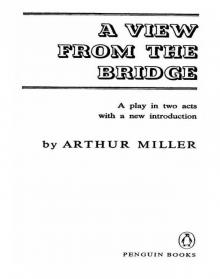 A View From the Bridge: A Play in Two Acts
A View From the Bridge: A Play in Two Acts Broken Glass
Broken Glass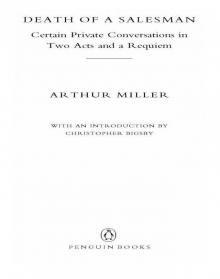 Death of a Salesman
Death of a Salesman Resurrection Blues
Resurrection Blues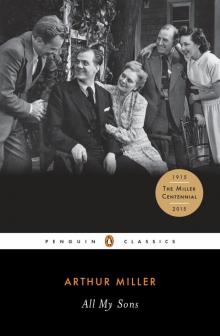 All My Sons
All My Sons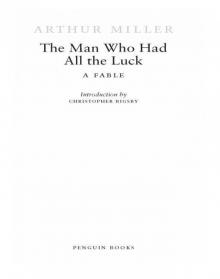 The Man Who Had All the Luck
The Man Who Had All the Luck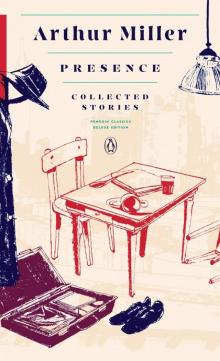 Presence: Stories
Presence: Stories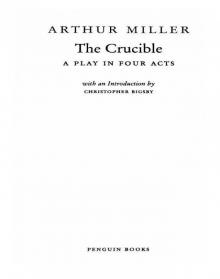 The Crucible
The Crucible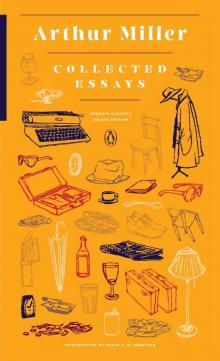 Collected Essays
Collected Essays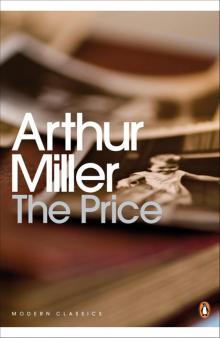 The Price
The Price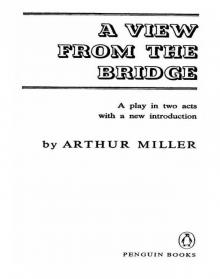 A View from the Bridge
A View from the Bridge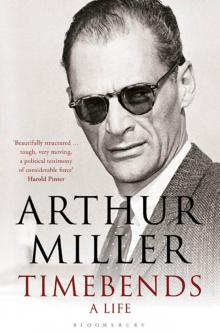 Timebends
Timebends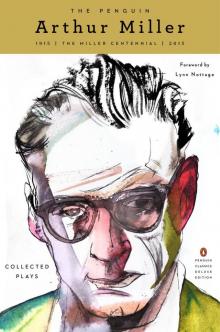 The Penguin Arthur Miller
The Penguin Arthur Miller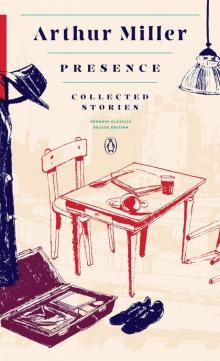 Presence
Presence